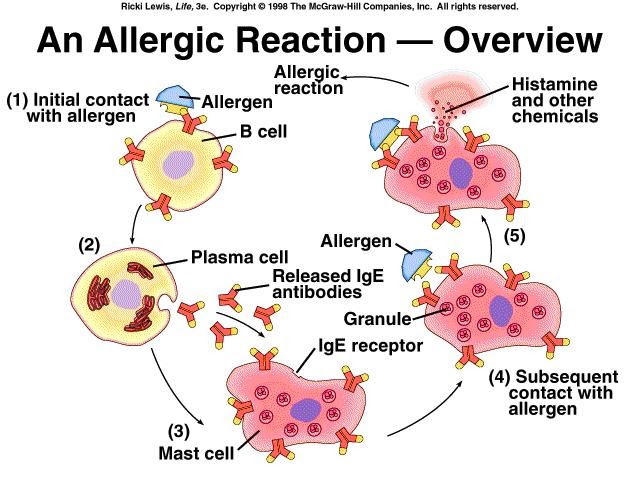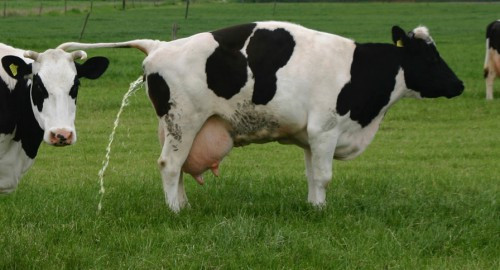I think I’ll start today with a bit of personal information. For most of my life I suffered greatly from allergies. Every year starting in late May and going through most of June I’d be absolutely miserable while late September was also pretty bad. Like most victims of allergy I’m not quite certain of everything that I’m allergic to but I know I’m allergic to dogwood pollen and, worst of all grass!

The absolute worse thing about an allergy is that it’s really all just a mistake! An allergic reaction occurs when your immune system mistakes the presence of a harmless substance as an attack by a lethal pathogen. That’s true, a few grains of grass pollen in my nostrils aren’t going to do me any harm but my body will react as if I’ve contacted the latest coronavirus.

I’ll get all of the typical symptoms, runny nose, sneezing, stuffed sinuses, sometimes even a fever just as if I had a cold or the flu but I’m not sick at all, my body just thinks I am. And I tried all of the remedies, antihistamines, steroids, decongestants but nothing did much good. At least my allergies didn’t worsen into asthma, an allergic reaction that causes a swelling of the esophagus that can be life threatening.

Funny thing is, now as I’m older my allergies are slowly going away. Over the last decade or so I may have one or two bad days every year. My symptoms now however are nothing like the misery I went through back in High School and College. Still, even today the smell of fresh cut grass can send chills down my spine.

Besides allergies to plant pollens like mine there are also people who have food allergies, some of which can be very severe, even lethal on occasions. Cow’s milk, egg whites, tree nuts, fish and wheat are all known to cause allergies but the two most common food allergies are to shellfish and peanuts.

Reactions to insect bites and stings are also common and these can be the deadliest form of an allergy. For some people a single bee’s sting may cause their esophagus to swell so much that they can literally suffocate without immediate treatment. For individuals with such severe allergies a shot of the medication epinephrine may be the difference between life and death and many carry a device known as an epinephrine autoinjector for just such emergencies.


The leading theory as to why we suffer from allergies is known as the hygiene hypothesis. Simply put the hygiene hypothesis states that thousands of years ago our ancestors living in the wild were constantly being bombarded with bacteria and viruses along with innocuous organic material like tree pollen. Our immune systems therefore evolved to not only fight this barrage but to expect it.

Today however we live in an artificial environment, the homes we live in possess both central heating and air conditioning so that we almost never open any windows. This means that we are rarely exposed to natural organic particles in the air, like pollen grains.

We also bathe or shower daily and wash our hands before meals and after going to the bathroom, again removing organic substances from our skin. We practice these hygienic habits because we know that they help to prevent the spread of diseases but those same habits also leave our immune systems without an enemy to fight causing them to become hyper-sensitive.
This theory also explains the fact that people in developed countries are more likely to acquire allergies than those in under developed countries and city dwellers more likely to suffer than farmers. It also explains why some people can lose their allergies over time. Take me for example, after 45-50 years of overreacting to grass pollen my body seems to have finally realized that it’s not harmful.
Armed with the hygiene hypothesis physicians have developed techniques, known as immunotherapy, where repeated applications of small doses of an allergy causing agent can enable the patient to build up resistance to their allergy. This technique has been found to provide considerable benefit to patients with environment allergens such as pollen and insect bites but only occasional success for people with food allergies.

A corollary to the hygiene theory is the farm factor, basically the idea that children who grow up on farms are so exposed to potential allergens that they acquire all of the immunities that our ancient ancestors once possessed. Exposure to one substance in particular seems to provide a strong protective effect, cow urine.
That’s right cow urine. Proteins called lipocalins that are found in cow urine are currently being studied at the University of Veterinary Medicine in Vienna by Doctor Erika Jensen Jarolim. Doctor Jarolim has been able to show that lipocalins are able to treat allergic reactions in labouratory mice, who if you think about it live a much more hygienic life than we do and should therefore be more susceptible to allergies.


The same proteins are also present in a cow’s milk but unfortunately the process of pasteurization to kill bacteria also destroys the lipocalins. Instead of milk Doctor Jarolim is currently working on a pill form of the lipocalins which unlike anti-histamines would actually provide an immunity to allergies rather than simply relieving their symptoms. Whether or not Doctor Jarolim succeeds in developing a treatment that will completely eliminate the scourge of allergies there is no doubt that progress is definitely being made. The more we understand the causes of the hypersensitivities that plague our immune systems the better able we will be to eliminating them.
